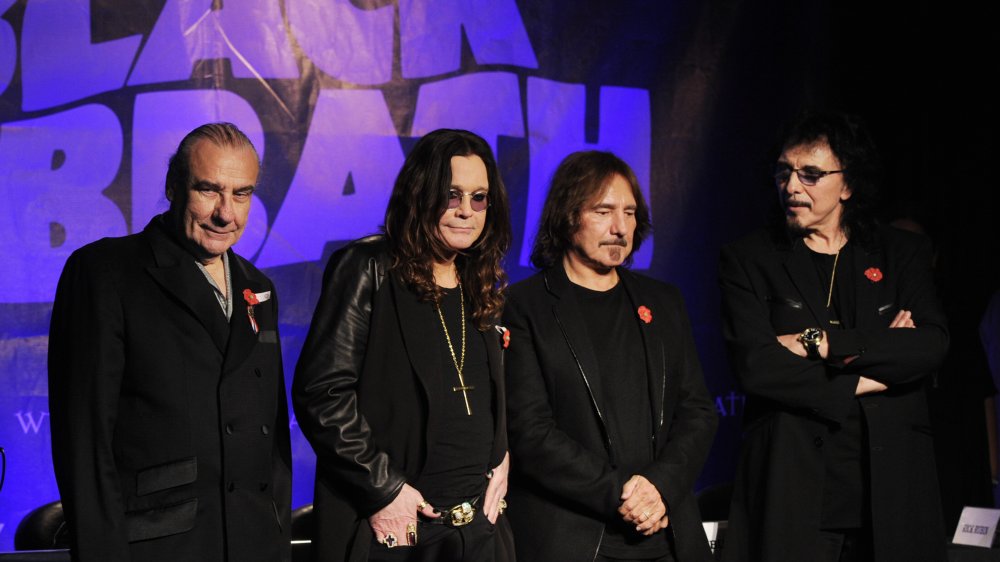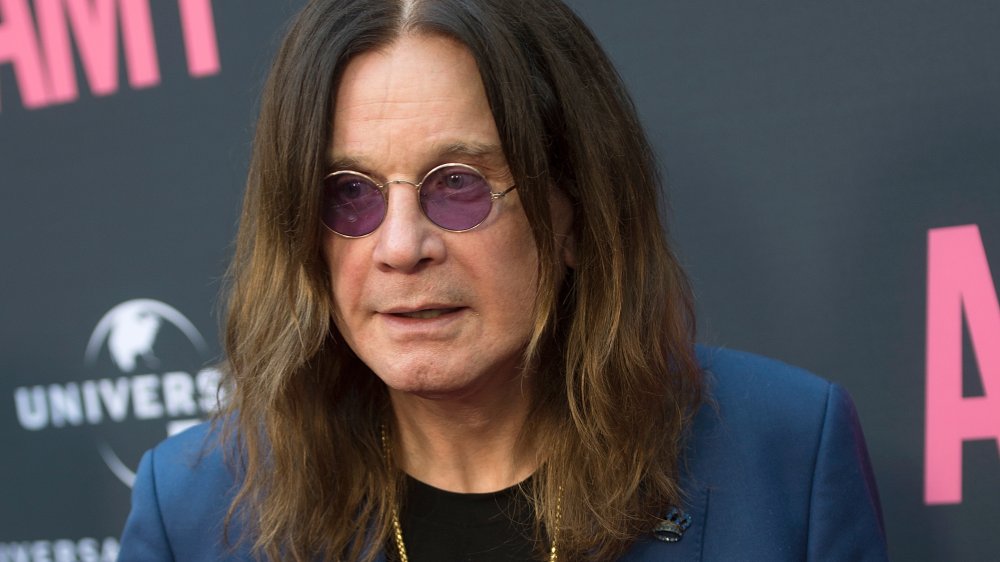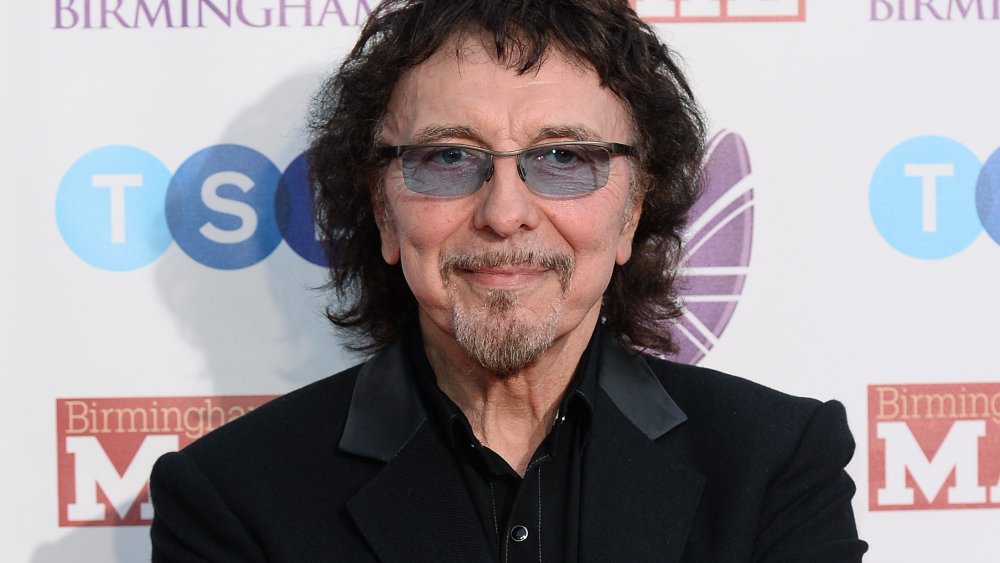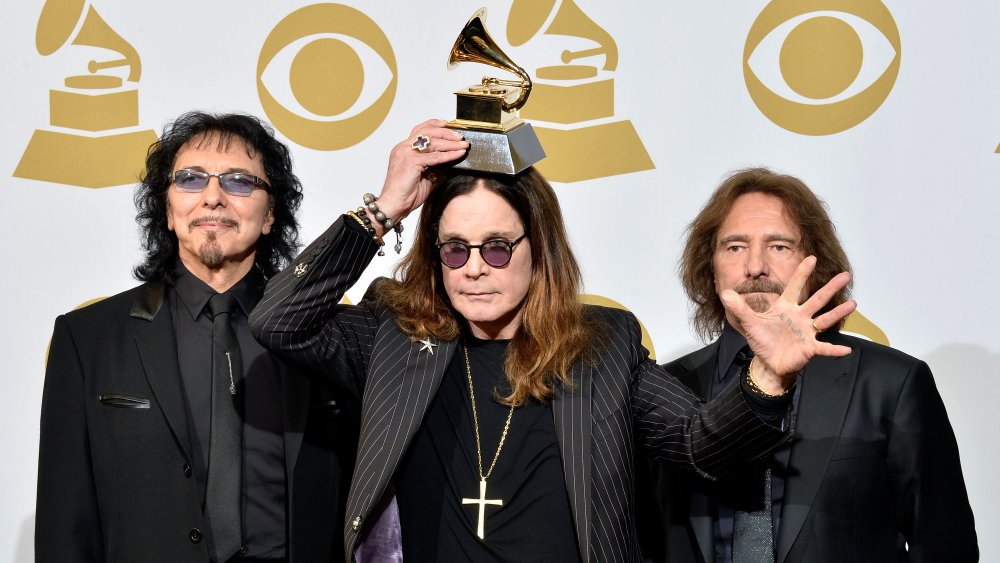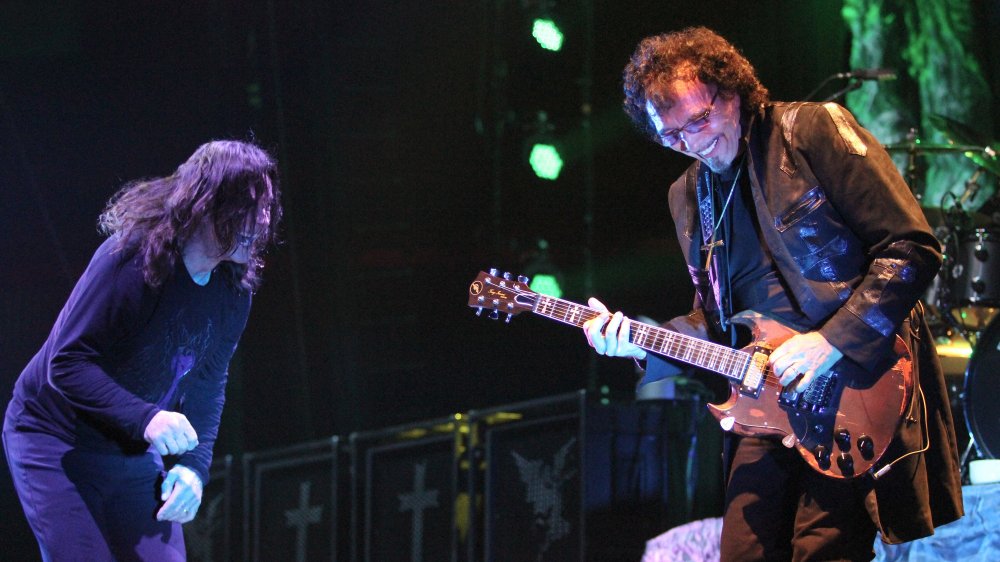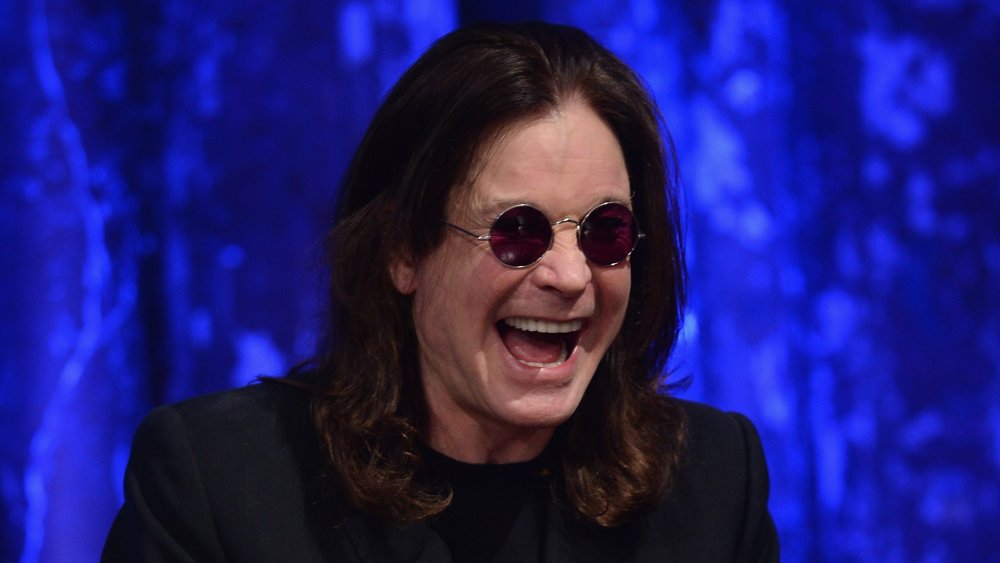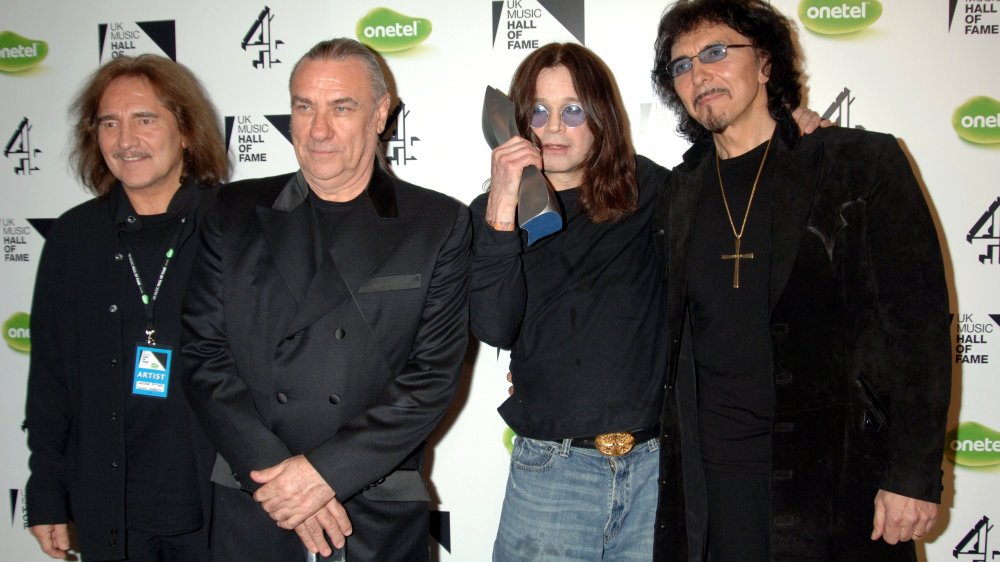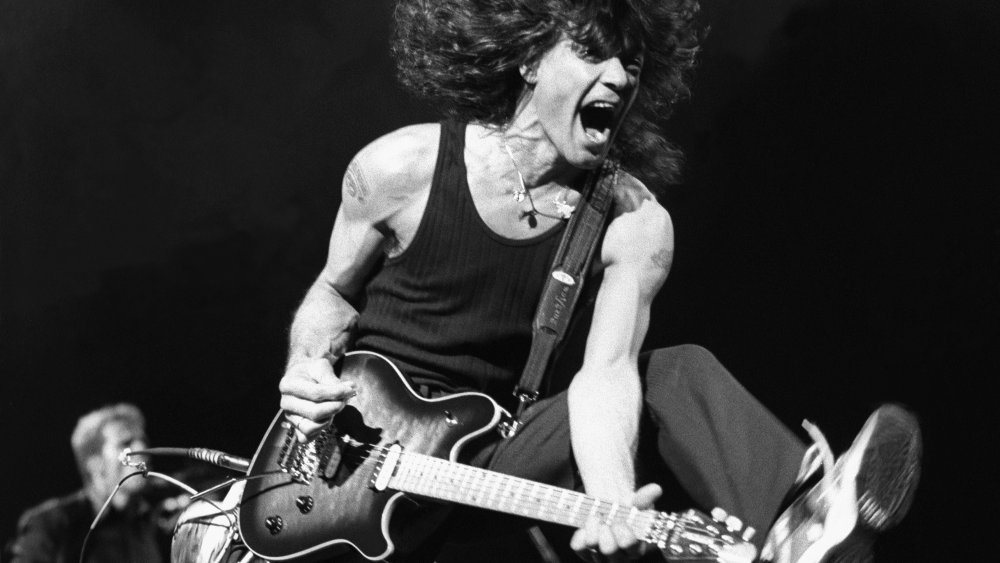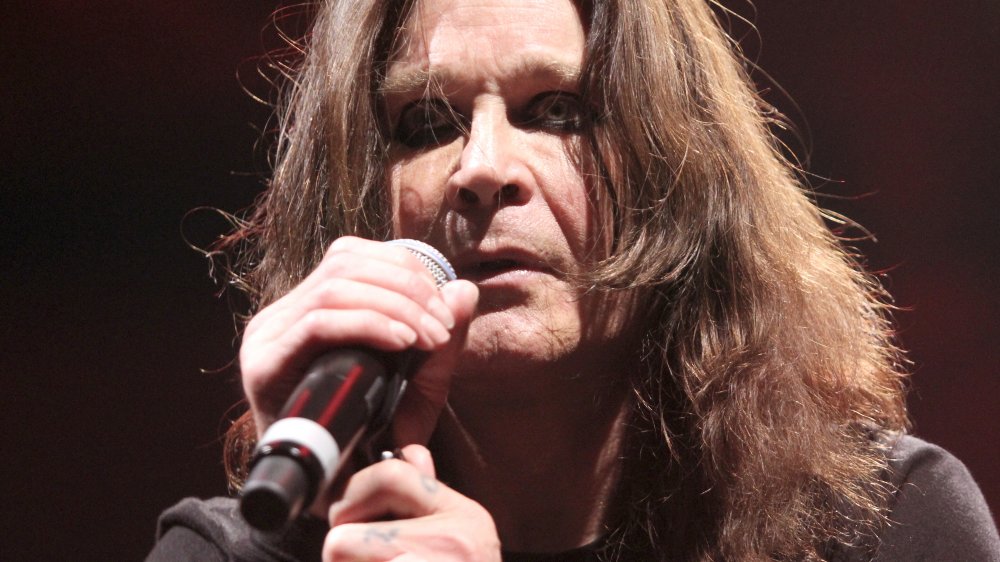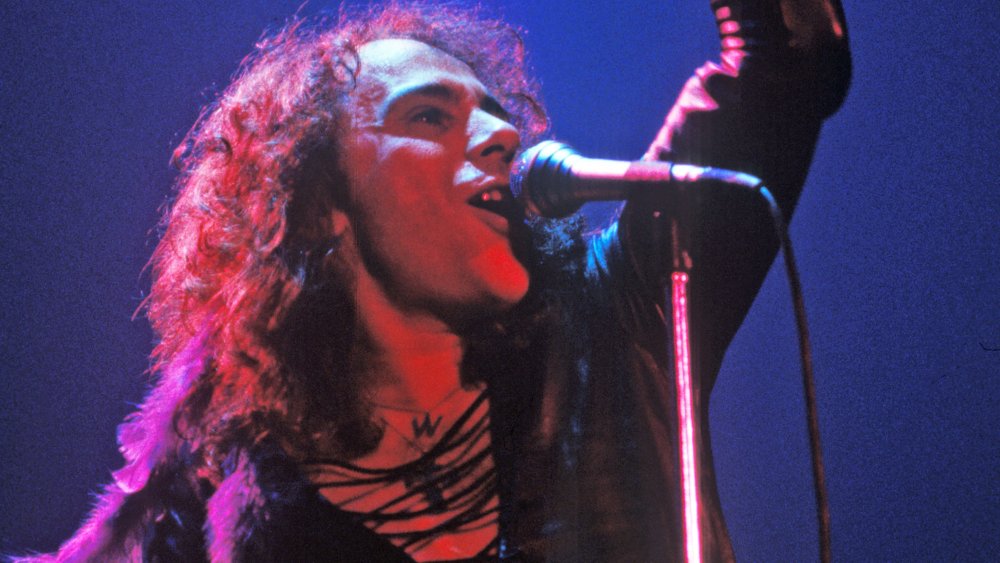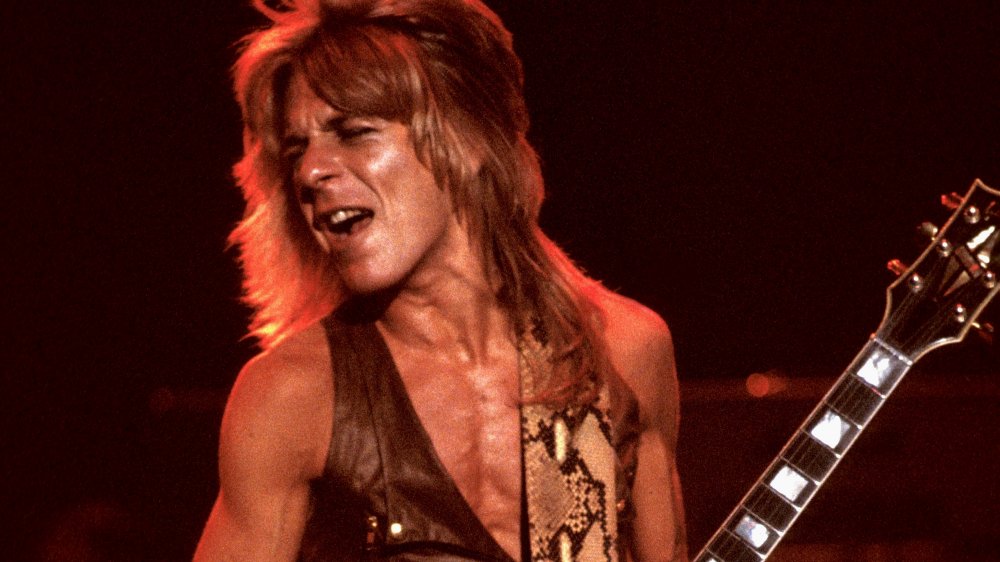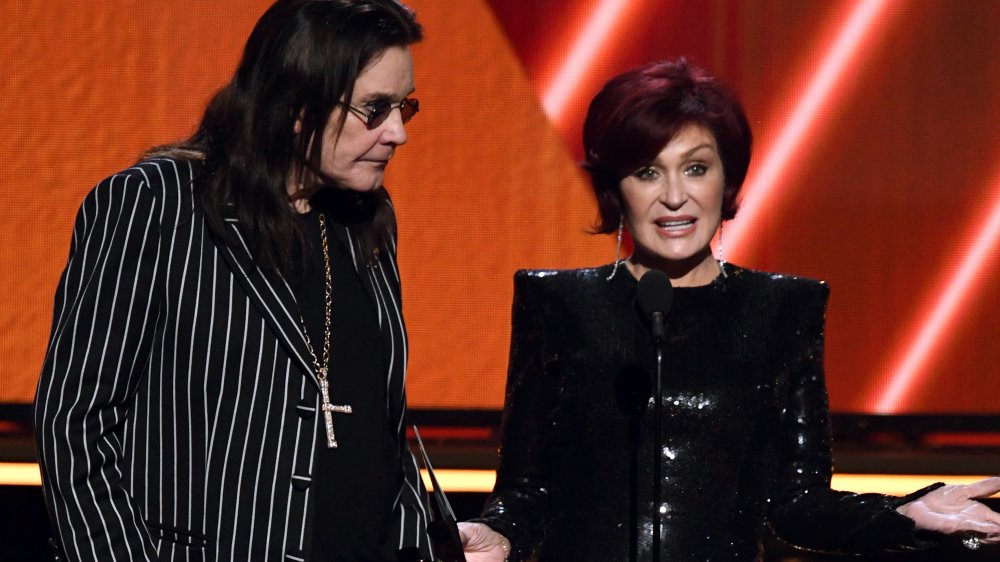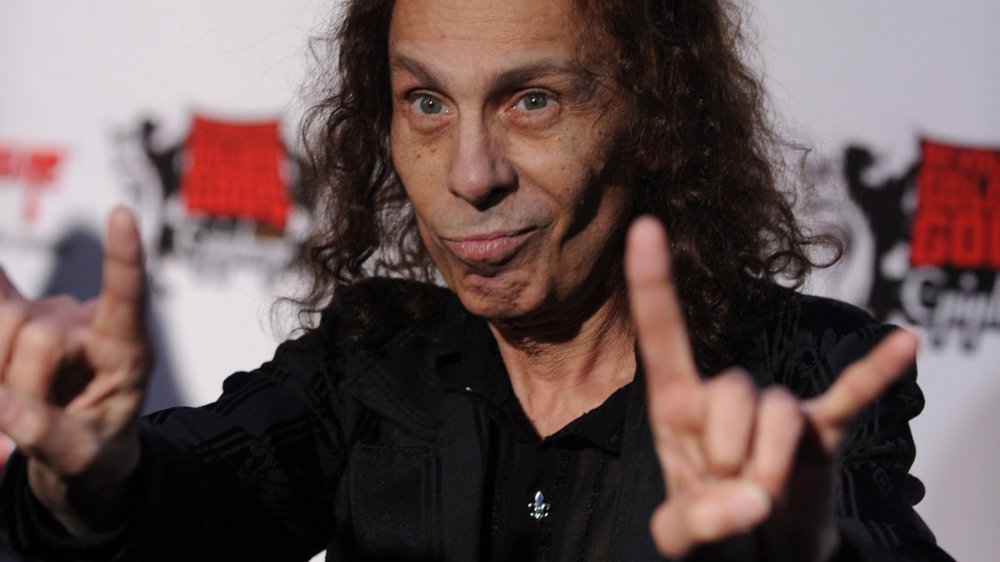The Tragic Real-Life Story Of Black Sabbath
We may receive a commission on purchases made from links.
They were the ultimate pioneers of heavy metal. Before Black Sabbath, metal was an occasional novelty that briefly shone through in the more blues-influenced works of Led Zeppelin and Steppenwolf. After Sabbath, metal was a lifestyle. Everyone, from metal bands who've toured the world, to the millions of head-banging fans in the decades since Sabbath's arrival on the scene in 1970, to the kids discovering the dark magic of the riff with a cheap guitar in a garage, owes it all to Sabbath.
But all those sinister lyrics and all that heavy riffing came from a dark place. The band members — classically, the bizarre, manic, and inimitable Ozzy Osbourne, brooding riff master and guitar legend Tony Iommi, and a legendary rhythm section comprised of Geezer Butler and Bill Ward — endured lifetimes of pain and struggles. From industrial accidents and childhood abuse to drug addictions, depression, infighting, lineup changes, and painful loss, this is the true, ugly, painful, tragic real-life story of Black Sabbath.
Ozzy Osbourne experienced poverty and abuse as a child
"Everything when you are a kid affects you in later life," said Ozzy Osbourne to London's Daily Mirror (via Entertainment Weekly). "If you build a wall with rocky foundations you are going to have a pretty unstable wall when it's finished." It's probably not too surprising, but original and current Black Sabbath frontman John Michael "Ozzy" Osbourne, known as much today for his unintelligibility, drug-addled debauchery, and bat-biting as for his asteroid-strike impact on popular music, did not have the easiest upbringing. Not only was he born to a severely impoverished family in Birmingham, England, but he struggled in school due to dyslexia and was routinely bullied and abused by neighborhood kids.
Without a friend to properly confide in, Osbourne turned to a life of petty crime and, at one point, suicide, to ease his pain. Fortunately, the attempt failed (obviously), and he's since gotten professional help to deal with the trauma. To this day, he attributes much of his ongoing struggles to the events of his childhood.
If you or anyone you know is having suicidal thoughts, please call the National Suicide Prevention Lifeline at 1-800-273-TALK (8255).
Guitarist Tony Iommi lost some of his fingertips in an industrial accident
Today, Sabbath axeman Tony Iommi is known as one of the godfathers of heavy metal, and he was the only consistent member throughout his band's numerous lineups. In 1965, though, he was known primarily by his coworkers as "the kid who lost his fingertips in that gruesome accident." We'll let him tell the story himself, like he did to Loudwire: "I'd be on a line and they'd pass stuff down to me and I'd weld it, and then it'd go on to somewhere else," Iommi said, describing the fateful day when he was 17. "One day, the person that would be sending me the thing to weld never turned up, so they put me on this giant, huge press — a guillotine-type press. I don't know what happened, I must have pushed my hand in. Bang! It came down. It just took the ends off [my fingers]."
Doctors told Iommi to forget about guitar, but — fortunately — he ignored them. Today, he wears convincing prosthetics, but he started by making his own using random household materials, eventually settling on leather from an old coat. It worked, but the pain forced him to tune down his guitar strings, adding a distinctive heaviness to Sabbath's sound. We can only hope the man who missed that factory shift appreciates how much of an impact his absence had on the history of music.
Black Sabbath was originally known as something very different
In his 2008 book, Sabbath Bloody Sabbath, Joel Mclver writes that there's some debate over whether or not Black Sabbath's original name was taken from a brand of talcum powder or an Indian/Pakistani clothing shop. It doesn't particularly matter. All we know is that the "Polka Tulk Blues Band" doesn't exactly inspire dread.
At the time, drummer Bill Ward, slide guitarist Jimmy Phillips, saxophonist Alan "Aker" Clarke, and guitarist Tony Iommi recruited bassist Geezer Butler and Ozzy Osbourne for vocals. (Interestingly, Iommi, who knew and disliked Ozzy from school, was initially opposed to his inclusion.) However, unconvinced of Phillips' and Clarke's dedication to the project, the group disbanded and quietly reformed as a four-piece called Earth. Although Iommi briefly left to (unsuccessfully) play with Jethro Tull, he quickly returned, and the band soldiered on.
One night, after seeing a 1963 film called Black Sabbath, Geezer Butler had a nightmare that ultimately inspired a song of the same name. "I woke up in a dream world and there was this black thing, staring at me," he later told Rolling Stone. "It just lasted a second, but it freaked me out." Not only did the group rename itself after the same song, but its scary lyrics and sinister sound pushed them, permanently, in a heavier, darker direction. The rest, as they say, is history.
Black Sabbath's self-titled debut received lousy reviews (but commercial success)
Black Sabbath's self-titled debut album was released on February 13, 1970, in the UK and June 1 of the same year in the States. It's now considered the first true heavy metal record, but at the time, Joel Mclver writes (once again, in Sabbath Bloody Sabbath) that critics didn't know what to do with it. How could they? People had heard hard riffs and questionable lyrics before (from The Who, Led Zeppelin, Steppenwolf, and even some Beatles songs), but the dark heaviness featured on Black Sabbath was in a league of its own. There was no precedent for it at all.
For Rolling Stone, critic Lester Bangs wrote in September of that year, "just like Cream! But worse," before going on to say that the album was "a shuck — despite the murky songtitles and some inane lyrics that sound like Vanilla Fudge paying doggerel tribute to Aleister Crowley, the album has nothing to do with spiritualism, the occult, or anything much except stiff recitations of Cream clichés." Still, the people loved it: Black Sabbath peaked at #6 in the UK and #23 in the US, where it was later certified platinum.
Black Sabbath engaged in out-of-control debauchery
Maybe it would be more surprising if a hard rock/heavy metal band from the classic era didn't spend astronomical amounts of time and money on women and cocaine. Debauchery is almost as integral to the art form as guitars and drums. Black Sabbath, who finally exploded onto the mainstream circuit with September 1970's landmark Paranoid (yes, the group released two albums that year), was no different. As timeless metal classics like "War Pigs," "Iron Man," and the title track ruled the radio, the band was blowing more money on, well, blow, than they had on the record itself.
Live For Live Music reports that while the group had a $60,000 budget to record the album, they had a $75,000 budget for cocaine (although we doubt that was itemized on their expense reports). In a 1998 interview with High Times, Ozzy details even more tales, ranging from how he once got caught at the airport smuggling acid in a Bible, to how the band would buy coke in sealed bottles and smoke "hash by the block," to how album recordings took far longer than necessary because of the various members' inebriation, to how bassist Geezer Butler's addictions got severe enough to scare him sober for good. It's a wonder any of the four guys are still with us, but we're glad they are.
Black Sabbath started to lose steam in the late 1970s
Master of Reality (1971), Vol. 4 (1972), Sabbath Bloody Sabbath (1973), Sabotage (1975), and Technical Ecstasy (1976) had all been successful enough to keep Black Sabbath relevant. By the end of the 1970s, though, a nonstop touring and recording schedule, worsening substance abuse issues, infighting, and creative exhaustion had begun to take their toll. Ozzy even briefly left the band during this period due to all this. Said Iommi to Guitar World in 1992, "We never wanted him to leave, and I think he wanted to come back — but no one would tell the other how they felt. So we had to bring in another singer and write all new material."
Ozzy returned, but mixed reviews and sales for 1978's "unfocused" Never Say Die! say everything you need to know about the band's condition at the time. According to the 2011 documentary God Bless Ozzy Osbourne, Ozzy said of the record in 1981, "The last album I did with Sabbath was Never Say Die! and it was the worst piece of work that I've ever had anything to do with. I'm ashamed of that album. I think it's disgusting."
Opening act Van Halen repeatedly blew Black Sabbath off the stage in 1978
Sabbath had given birth to heavy metal music, and several acts (Judas Priest and Saxon among them, soon to be followed by the likes of Iron Maiden and Motörhead) carried on their dark, heavy legacy even as Sabbath itself began to lose steam. Other bands, however, took heavy music and decided to have a bit fun with it. Perhaps no act exemplified the idea of playing metal with a smile in the late '70s than California party rockers Van Halen, who opened for Sabbath on the headliner's Never Say Die! tour in 1978.
Throughout the tour, Sabbath played lumbering, frustrated sets indicative of their unraveling. Van Halen, just beginning to take off, preceded those with performances of their own that were packed with energy and face-melting musicianship, according to PJ Media. Although Sabbath's experience helped offset their exhaustion and delivered just enough bang for the fans' buck, the contrast was immense and impossible to ignore. Eddie Van Halen's lightning-fast, revolutionary finger tapping threatened to send Iommi's slow, heavy riffing the way of the dinosaurs, and David Lee Roth's manic, comical, doing-the-splits-in-midair fronting style made Ozzy, then only 30, look twice his age. Said Ozzy to Circus Magazine during the tour, "Van Halen are so good they ought to be headlining the tour."
Ozzy Osbourne was fired for substance abuse
Fronting one of biggest bands had given a young Ozzy a sense of purpose for the first time in his life, according to Loudwire. But by the time the band began to fall apart, he found himself questioning his self-worth again. The resulting despair led him further into an abyss of drug abuse, which began to impact his performances. Ozzy also began missing rehearsals regularly (at one point disappearing for six weeks!) and making excuses for why he couldn't record the next record.
The band ultimately fired Ozzy on April 27, 1979. Said Iommi, "We just couldn't continue with Ozzy. [...] Nothing was happening and it would have meant the end of the band. We didn't want to fire him but we had to if we wanted to continue."
Perhaps understandably, Ozzy was hurt by the decision for years. "I'd be lying if I said I didn't feel betrayed by what happened with Black Sabbath," he wrote in his 2010 autobiography, I Am Ozzy. "We were four blokes who'd grown up together a few streets apart. We were like family, like brothers. And firing me for being f*cked up was hypocritical bullsh*t. We were all f*cked up. If you're stoned and I'm stoned and you're telling me that I'm fired because I'm stoned how can that be? Because I'm slightly more stoned than you are?"
Black Sabbath struggled to replace Ozzy
Black Sabbath soldiered on into the '80s without their longtime frontman, a fact that took its toll on the members. Bassist Geezer Butler briefly left the band for personal reasons in 1979 and was replaced by Craig Gruber, who helped record material for the upcoming record. (Gruber himself was replaced by Geoff Nichols, before Butler returned in 1980.) Later that year, drummer Bill Ward's alcoholism "accelerated," due to his personal frustrations related to Ozzy's firing, and he quit the band in anger during the Heaven and Hell tour. He was replaced by fan-favorite Vinny Appice. Ozzy himself was replaced by the "little man with a big voice," Ronnie James Dio.
Dio, known for his gorgeous, operatic vocals and his popularization of the "devil horns," was a breath of creative fresh air for the band and has since gone on to become one of the most beloved and celebrated vocalists in metal history. However, his initial stint with the group was tense. A miscommunication led Butler and Iommi to accuse Dio of sneaking into the studio to mix his vocals at the expense of the other member's tracks. (Apparently, this was untrue.) Hurt by the accusation and feeling frustrated by what he felt was a lack of creative freedom, Dio left and, along with drummer Vinny Appice, formed a solo act called Dio. The group hired Deep Purple's Ian Gillan to sing on 1983's Born Again, which was a commercial success but received mixed reviews.
Ozzy lost his new guitarist
Like Ronnie James Dio, Ozzy Osbourne also started a solo project in the early 1980s. And unlike most solo careers launched by bitter former lead singers, his was instantly and enduringly successful. His first two records, Blizzard of Ozz (also the original name for his solo project) and Diary of a Madman, were packed with hit singles like "Crazy Train," "Mr. Crowley," "Flying High Again," and "Over the Mountain." The records completely revolutionized his career and helped define the sound of '80s metal.
Ozzy also began his long and storied history of collaborating with some of the era's most lethally talented guitarists, a list which now includes master shredders like Jake E. Lee and Zakk Wylde. Perhaps his most notable right-hand man on the ax, though, was beloved, classically trained legend and Quiet Riot founder Randy Rhoads, who penned some of classic metal's greatest riffs and solos and rapidly rose to prominence.
Sadly, Ultimate Classic Rock reports that he was killed, along with two others, in a freak 1982 plane crash. "We had a great rapport together," Ozzy told Guitar Player some months later. "We loved each other very dearly. I swear to God, the tragedy of my life is the day he died." Rhoads, all of 25 when he passed and barely having started his career, has since gone on to become one of the most celebrated guitarists in rock history.
Ozzy nearly died in an ATV accident
By the 2000s, Ozzy, who had reunited with Black Sabbath at 1997's Ozzfest, had become legendary for his outrageous rock star antics and out-of-control, hard-partying debauchery. So it was surprising to hear, in December 2003, that it was an ATV accident, of all things, that nearly killed the Prince of Darkness.
As Ultimate Classic Rock reports, Osbourne was simply taking a joyride across his London estate when he crashed the vehicle. His son, Jack, told reporters that night that Osbourne had suffered "a broken collarbone, eight fractured ribs that were pinching crucial blood vessels, and a damaged vertebrae in his neck."
Thankfully, Ozzy's life was saved in the emergency room. On top of that, the incident helped Ozzy and his family to realize that the gargantuan number of prescriptions he was on was a large contributing factor to Ozzy's bizarre, confused stupor he could be found in throughout much of his family's reality TV show, The Osbournes. They probably had a hand in his ATV crash, as well.
Dio died from cancer in 2010
With Ozzy back in full swing as Sabbath's frontman by the mid-2000s, some fans began yearning for the Dio years. Iommi, Butler, Dio, and Appice recorded some material for a limited release celebrating their work together in the early '80s, called Black Sabbath: The Dio Years, which was released in 2007. The quartet then embarked on a tour. To avoid confusion with the ongoing Black Sabbath, and to prevent fans from expecting to hear Ozzy-fronted classics at the shows, Iommi changed the band's name to Heaven & Hell, after their first album together.
Sadly, the celebrated reunion project was short-lived: According to Loudwire, Ronnie James Dio was diagnosed with inoperable stage IV stomach cancer. All further band activity was suspended, and Dio passed away on May 16, 2010. "Ronnie loved what he did, making music and performing onstage," Iommi wrote in a public tribute. "He loved his fans so much. He was a kind man and would put himself out to help others. I can honestly say it's truly been an honor to play at his side for all these years. His music will live on forever. The man with the magic voice is a star amongst stars, a true professional. I'll miss you so much, my dear friend." On May 30, metal heroes joined thousands of fans at a public funeral that commemorated the passing of a legend.
